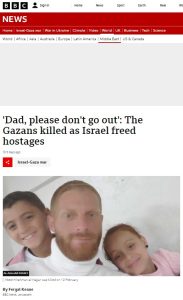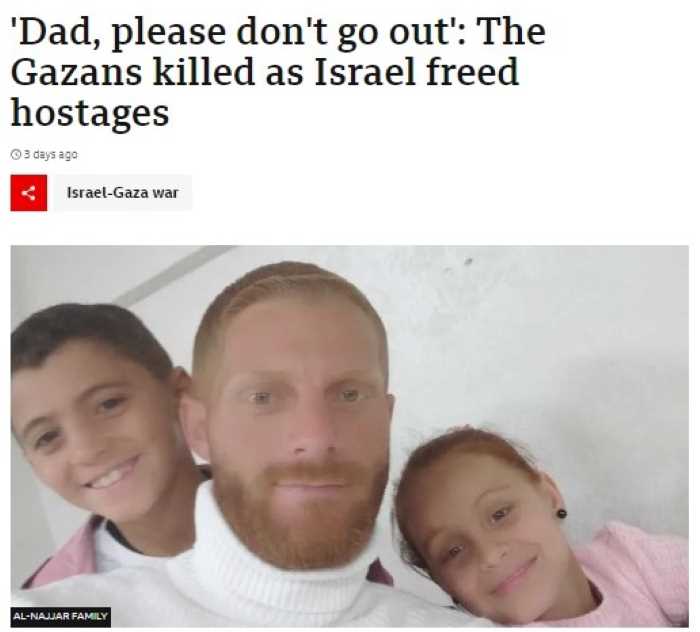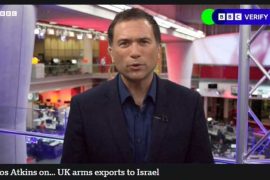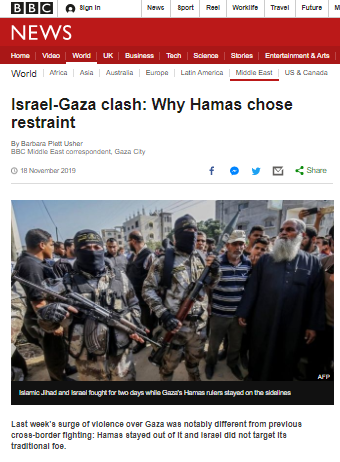Since last October, the BBC’s ‘special correspondent’ Fergal Keane has produced multiple items relating to the war between Israel and Hamas.
Those items present a monochrome and highly limited view of the conflict from the perspective of Palestinians, with most playing heavily on the emotions of readers or viewers.
Notably, although those items relate to stories from the Gaza Strip, they were mostly produced by journalists not present in the territory, with repeat contributions from filmmaker Alice Doyard and a relatively new BBC employee, Haneen (or Hanin) Abdeen.
‘Israel-Gaza war: The brutal impact on Gaza’s children’ 24/10/23
‘Humanity blasted and broken: Gaza through a medic’s eyes’ 25/10/23, “With additional reporting from Majdi Fathi in Gaza and Morgan Gisholt Minard, Alice Doyard, Haneen Abdeen and Tim Facey in Jerusalem”
‘Reporting on Gaza: ‘Sometimes from behind the camera I just stand and cry’’ 31/10/23, “With additional reporting from Haneen Abdeen, Alice Doyard, Morgan Gisholt Minard and John Landy in Jerusalem” – discussed here
‘Israel Gaza: Father loses 11 family members in one blast’ 31/10/23, “Additional reporting by Mahmoud Bassam in Gaza, and Hanin Abdeen, Alice Doyard, Morgan Gisholt Minard, and John Landy in Jerusalem”
‘‘I simply don’t want to die at 24’ – Gaza woman trapped at Rafah crossing’ 1/11/23, “Additional reporting by Mahmoud Bassam in Gaza, and Hanin Abdeen, Alice Doyard, Morgan Gisholt Minard, and John Landy in Jerusalem.”
‘Israel-Gaza: The devastating effects of war on Gaza’s children’ 6/11/23
‘The writers who reached out across the divide’ 6/11/23, “With additional reporting from Haneen Abdeen, Alice Doyard, Morgan Gisholt Minard in Jerusalem” – discussed here and here
‘‘I don’t want to be a number’: Gazans live in fear of dying’ 20/12/23
‘Israel-Gaza war: Relief and guilt after Gazans find safety in Egypt’ 18/2/24, “Additional reporting by Haneen Abdeen, Wael Hussein and Alice Doyard.”
Abdeen and Doyard are also credited in another report by Keane which was published on the BBC News website on February 21st under the headline “‘Dad, please don’t go out’: The Gazans killed as Israel freed hostages”.
A filmed version of that report was aired on the BBC News channel: “BBC investigation suggests dozens of civilians killed during Israeli hostage rescue” with no mention of who did the filming and interviewing on the ground in Rafah. The item also appeared on the Australian channel SBS, which is a BBC partner. It is presented by Keane as “the story of the price paid by the civilians of Rafah on the night of February 12th”.
Both those items relate to reports concerning Palestinians killed or injured during the rescue of two Israeli hostages from Rafah early on February 12th, coverage of which was previously discussed here:
BBC NEWS WEBSITE COVERAGE OF RAFAH HOSTAGE RESCUE
In one of the two reports published immediately after the rescue operation, David Gritten referred to an account given to another media organisation:
“At the nearby Kuwait Speciality Hospital, a Palestinian girl receiving treatment for shrapnel wounds to her neck said her father was killed when a camp for displaced people was struck.
“We were in the tent, me and all my family, when the bullets all came at us. My father went to see what’s happening and said there were strikes, and a strike happened while he was talking,” Mai al-Najjar told Reuters.”
Keane’s two reports also feature the al-Najjar family.
“They fell into the exhausted sleep of refugee life. Then shortly before 02:00 (00:00 GMT), Nawara woke to the sound of shooting.
Abed-Alrahman said he would go out and see what was happening.
Nawara says: “Our oldest son was telling him, ‘Dad, please don’t go out’. [Abed-Alrahman] was trying to reassure him that nothing would happen; my son was telling him not to go out, that he would die.”
Then she felt a searing pain in her head. Shrapnel from an explosion had ripped into the tent.
Nawara started screaming. At first she could not see anything. After some minutes her vision returned in time to see Abed-Alrahman in his death throes. She remembers the “rattle” of his final breaths.”
Neither of Keane’s reports – including the filmed version presented as an “investigation” – address the question of the source of the shooting which killed Mr al-Najjar even though, as reported by Gritten on February 12th, the IDF forces encountered heavy gunfire from Hamas terrorists in the building in which the hostages were held and surrounding areas.
Additional accounts presented in the written version of Keane’s report also downplay the fact that the IDF forces were not the only source of gunfire in the area:
“He remembers being woken in his tent by the intensity of the assault. “They were shelling with helicopters, with F-16 jets …My son was shot in his hand. Our neighbour was shot in the head.””
“”Aside from the air strikes, we were hearing tanks in the background, there was active exchange of fire from small firearms, as well as a helicopter gunship that was going over the hospital fighting and firing in all directions. So, it was very, very scary. We thought that this was it.””
Keane tells readers of his written report that:
“According to the health ministry, run under the direction of the Hamas government in Gaza, at least 74 people were killed during the raid in the early hours of 12 February.
It is not possible to say precisely how many of the dead were civilians and how many were fighters. But witnesses and medical sources suggest a high proportion of the dead were non-combatants. The independent Palestinian Centre for Human Rights, based in Gaza, using details obtained from hospital lists, says 27 children and 22 women were among those killed.”
The synopsis to the filmed version similarly states: [emphasis added]
“The BBC has heard evidence from people caught up in the raid and doctors who treated the victims, who say a large proportion of those killed and injured by Israeli soldiers were civilians. The independent Palestinian Centre for Human Rights, based in Gaza, using details obtained from hospital lists, says 27 children and 22 women were among those killed.”
Given that the Palestinian Centre for Human Rights (PCHR) has long been quoted and promoted by the BBC – including during previous conflicts – Keane and his colleagues should know that the NGO they describe as “independent” is in fact linked to the PFLP terrorist organisation. In November 2023, the Swiss government terminated its donations to the PCHR.
As has been the case in the past, the PCHR (which was caught lying about the cause of death of a Palestinian in 2015) is currently actively involved in lawfare against Israel. The PCHR’s director, Raji Sourani, is listed as one of the advisors to the South African delegation which brought proceedings against Israel to the ICJ late in 2023.
Nevertheless, Keane and his colleagues would have BBC audiences believe that they should take whatever the PCHR says about casualties in Rafah on February 12th at face value, while making no attempt to inform them of that quoted NGO’s agenda.
Moreover, Keane uncritically cites an additional NGO with a highly problematic record on Israel – ‘Human Rights Watch’ – in order to support his framing of the story.
“Human rights organisations have previously accused Israel of using disproportionate force. In a statement on 8 February – four days before the hostage raid – Human Rights Watch warned that Israel “might be carrying out unlawfully indiscriminate attacks. When it comes to the question of whether Israel is violating the law in Gaza, there is enough smoke to suspect a fire”.”
Failing to provide readers with factual information concerning the principle of proportionality, he continues: [emphasis added]
“Any legal deliberation on whether the raid constituted a disproportionate use of force, and therefore a war crime, must await an independent investigation. With no end to the war in sight, that process may take a long time.”
Keane and his colleagues however have absolutely nothing to tell BBC audiences about the legal status of terrorists invading a sovereign country, abducting hostages from their homes and incarcerating them in a building close to a camp site for displaced people and a field hospital. His only comment on that topic, both in his written and filmed reports, comes in the form of a cited ‘accusation’:
“Since the beginning of the IDF incursion into Gaza, the military has accused Hamas of using the civilian population as human shields, and using medical facilities to conceal military operations and hide hostages.”
The point of this and previous content produced by Fergal Keane is clearly not to inform BBC audiences about the current war by means of accurate and impartial reporting. Rather, Keane’s reports inevitably focus audience attentions on emotional accounts from one side of the conflict alone and thereby distort views of a story which is far more complex.
In this case, Keane seeks to convince BBC audiences that civilians in Rafah were killed and injured exclusively “by Israeli soldiers”, based on subjective accounts and claims from ‘human rights’ NGOs with a blatant anti-Israel agenda, but makes no attempt whatsoever to provide forensic evidence to prove the allegations that he then portrays as possible evidence of “a war crime”.
Related Articles:
BBC NEWS WEBSITE REPORTING ON THE DEATHS OF JOURNALISTS
BBC JOURNALISTS CONTINUE TO IGNORE IMPARTIALITY AND SOCIAL MEDIA GUIDELINES
BACKGROUND TO A ‘HUMAN RIGHTS’ NGO WITH EMPLOYEES RECENTLY FEATURED IN BBC CONTENT
LAWFARE AGENDA OF BBC’S SOURCES ON GAZA CASUALTY FIGURES REVEALED ONCE AGAIN






Fergal Keane
@fergalkeane47
You’re blocked
You can’t follow or see @fergalkeane47’s posts. Learn more
See https://www.theguardian.com/books/2023/aug/06/fergal-keane-bbc-war-correspondent-memoir-the-madness-ptsd
Not only was he on the bottle but reported from Lebanon in 2006.
See https://www.theguardian.com/media/greenslade/2006/aug/01/columnistattacksbbcforemot
“Despite the black humour, Reid says does not want to “impugn Keane’s personal sincerity”, but adds: “I wish that his employers had not taken the decision to give his kind of over-wrought journalism such a high-profile role in their Middle East war coverage”. She goes on to argue that the BBC “has succumbed to the pressures to emotionalise events in Lebanon: dumbing down almost, it seems to me, to the level of EastEnders.”
Says it all